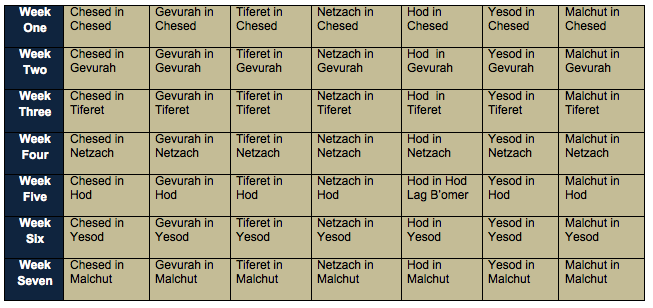Can we start anew each day, each moment? Memory is like an anchor in the flow of time. We remember our ports of call, the people, places, tastes, smells, feelings etc. Can we really ever start anew? Can starting anew carry any memory from the past?
Starting next week on the second night-day of Passover we begin a 50 day count (referred to as the counting of the Omer). Each day is counted, a day unto itself. We actually count 49 days, the 50th day is ‘counted’ by itself—and is the holiday of Shavuot, the day of the revelation of Torah (historically, the day the Jewish people became the Jewish people at Sinai through their encounter with God).
For more than three millennia we use this count to exit a state of constriction (symbolized by enslavement in Egypt) to a state of freedom. As we explain in our Kabbalah studies, one central constriction a slave deals with is that time is not their own. We too struggle with being in time that is not constricted—time that is free, time that is neither day nor night (a part of a song sung at the Passover Seder: “a time is coming that is neither day nor night) is the present moment—NOW. There are teachings in the Kabbalah and from the East that say that the past (and future) is illusion. But memory serves us to be aware of what we want to bring into the present. Such as a memory of where we were last year at this time and where we are this year. The question for our meditation as we count is not where we are in our thoughts (recollecting a past) but when are we? Are we in the present with our thoughts.
This 50 day count is a daily practice in living in the present moment. Each day counts unto itself. We are not stitching something together; we are not adding one brick to another. We simply take each day as it is –in its newness and uniqueness and live that day. To highlight the uniqueness of each day a Kabbalistic tradition is to assign a special intention for each of the days—a uniqueness for each day. These intentions are linked to the system of the Sefirot on the Tree of Life (if you have not studied this yet the intentions will be understood without that knowledge) from Chesed to Malchut. The seven (lower) Sefirot are assigned, one to each of the seven weeks of the count as follows:
I will be blogging an intention for each day of the count starting next Tuesday night-Wednesday day for 49 days. These blogs will appear on our website in order with the latest one on top.











0 Comments